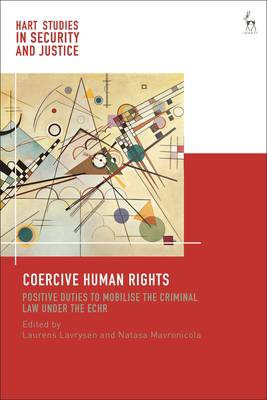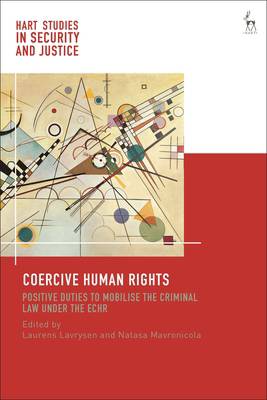
- Retrait gratuit dans votre magasin Club
- 7.000.000 titres dans notre catalogue
- Payer en toute sécurité
- Toujours un magasin près de chez vous
- Retrait gratuit dans votre magasin Club
- 7.000.0000 titres dans notre catalogue
- Payer en toute sécurité
- Toujours un magasin près de chez vous
Coercive Human Rights
Positive Duties to Mobilise the Criminal Law under the ECHR
203,95 €
+ 407 points
Description
Traditionally, human rights have protected those facing the sharp edge of the criminal justice system. But over time human rights law has become increasingly infused with duties to mobilise criminal law towards protection and redress for violation of rights. These developments give rise to a whole host of questions concerning the precise parameters of coercive human rights, the rationale(s) that underpin them, and their effects and implications for victims, perpetrators, domestic legal systems, and for the theory and practice of human rights and criminal justice. This collection addresses these questions with a focus on the rich jurisprudence of the European Court of Human Rights (ECtHR).
The collection explores four interlocking themes surrounding the issue of coercive human rights:
First, the key threads in the doctrine of the ECtHR on duties to mobilise the criminal law as a means of delivering human rights protection.
Secondly, the factors that contribute to a readiness to demand coercive measures, including discrimination and vulnerability, and other key justificatory reasoning shaping the development of coercive human rights.
Thirdly, the most pressing challenges for the ECtHR's coercive duties doctrine, including:
- how it relates to theories and rationales of criminalisation and criminal punishment;
- its implications for the fundamental tenets of human rights law itself;
- its relationship to transitional justice objectives; and
- how (far) it coheres with the imperative of effective protection for persons in precarious or vulnerable situations.
Fourthly, the (prospective) evolution of the coercive human rights doctrine and its application within national jurisdictions.
The collection explores four interlocking themes surrounding the issue of coercive human rights:
First, the key threads in the doctrine of the ECtHR on duties to mobilise the criminal law as a means of delivering human rights protection.
Secondly, the factors that contribute to a readiness to demand coercive measures, including discrimination and vulnerability, and other key justificatory reasoning shaping the development of coercive human rights.
Thirdly, the most pressing challenges for the ECtHR's coercive duties doctrine, including:
- how it relates to theories and rationales of criminalisation and criminal punishment;
- its implications for the fundamental tenets of human rights law itself;
- its relationship to transitional justice objectives; and
- how (far) it coheres with the imperative of effective protection for persons in precarious or vulnerable situations.
Fourthly, the (prospective) evolution of the coercive human rights doctrine and its application within national jurisdictions.
Spécifications
Parties prenantes
- Editeur:
Contenu
- Nombre de pages :
- 328
- Langue:
- Anglais
- Collection :
Caractéristiques
- EAN:
- 9781509937875
- Date de parution :
- 12-11-20
- Format:
- Livre relié
- Format numérique:
- Genaaid
- Dimensions :
- 156 mm x 234 mm
- Poids :
- 625 g

Les avis
Nous publions uniquement les avis qui respectent les conditions requises. Consultez nos conditions pour les avis.





